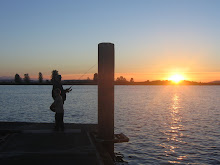 Weight: 196.6
Weight: 196.6Dr. Ron was a friend of mine who died in 2005 after serving as a colleague at another college in the field of anthropology. He often invited my family to stay at his 60 acres. There, he reburied Native American remains disturbed by construction, grew tobacco, and lots of food, taught students about the edible and medicinal plants in the region, and had a lot of fun hosting pow wows at his big lodge. I've thought of him many times over the last few years because he was kind to my family and taught my sons a lot about traditional agriculture and taught his students a lot about anthropology. The thing I regret is that I never paid enough attention to his lessons. I do recall some things about growing and drying tobacco, the value to his friends of sage, and a lot about breeding hot peppers. But I never learned the most important identification lessons. And now I'm thinking I need to find someone with his knowledge and somehow bribe them to tell me what he was trying to tell me all along--the species of plant all around me that I could be enjoying.
Seven years ago, at this time of year, my family and he dug up a couple wheel barrows full of sweet potatoes. We ate so much that I don't think I've had them since then. We put butter and brown sugar on them, we turned them into sweet potato fries, we turned them into pies. And eventually, I just overloaded. And now ... what I wouldn't give for one sweet potato. The solid carbs would be real nice right now. But I neither remember how to cultivate them, nor thought to plant them.
And this causes me to recall something I was researching when I worked with Ron: the Huguenots who settled in Florida, and almost starved in the 16th century. Florida! How can anyone starve in Florida? They have the sea, a good climate for finding and cultivating things, lots of land game at the time--a virtual Eden. And they couldn't hack it. My disdain for them at the time is now coming back as shame upon my head. You see, they had neighbors, the Timucuans, who had the answers to their agricultural and foraging problems. Yet these French folk were all too urbanized to have a clue what they were doing. They may have known how to grow things in their home towns, but they didn't understand the soil, nor know the plants of the region. A few ended up going to live with the Timucuan people, but others used their modern technology to build a makeshift boat back to Europe. Along the way they had to resort to cannibalism, and arrived looking like skeletons off the coast of England.
But I am even more ill equipped than they were. And here is my point: it's not that I just don't have any sweet potatoes. I don't have any potatoes. And if you look in my back yard, you can see that the side of the plumb tree that is on my side of the fence is nearly bare of fruit, but my neighbor's is full. I've eaten all the green beans given me by my colleague, I've eaten all the hot peppers in my garden. I'm eating the carrots before they are big enough to be of the most nutritional value, and I am in the awkward position of complaining that all the dandelions and most of the amaranth (both pesky but nutritious weeds) are gone. I am not even at the half way point and I feel like the unwise French settlers who couldn't hack it it lush Florida. No new plants were discovered today, but no new fruit is replacing what just one man has eaten.
I'm worried that my project will fail now that autumn is upon me. I'll have to rely more on mushrooms, but I've not found many of late and I don't have much time to hike around without having the strength that comes from food. I may have to just start eating spoonfuls of blackberry jam. (BTW: I ate the rest of my rye bread, the stuff I made a couple days ago. At least I savored every morsel). Our butter is gone. I'm looking at my dear wife and I'm thinking she would make a great Italian sausage (kidding).

No comments:
Post a Comment